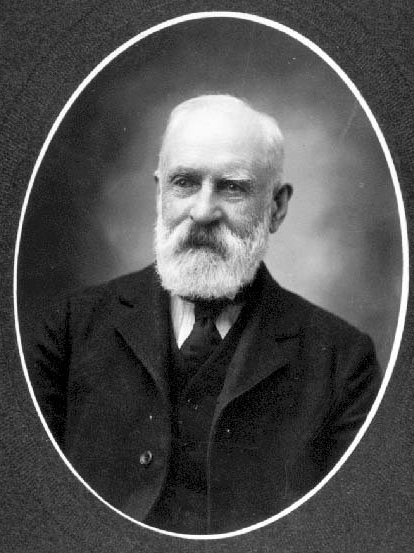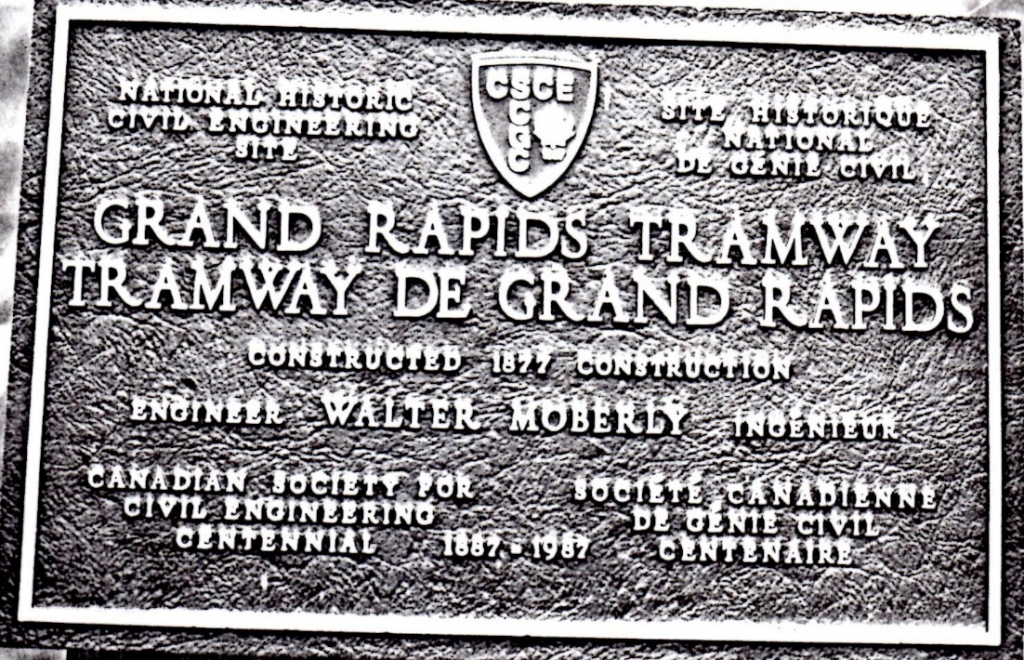Grand Rapids Tramway, Grand Rapids, MB.

Site Location: Lat.: 53° – 9’ – 54” N.; Long.: 99° – 16’ -17” W. (GPS: 53.1650153, -99.2714299) Tramway Park, Grand Rapids. Take Manitoba Highway 6 to Grand Rapids. Turn left (south) on Grand Rapids Drive and, after 2.1 km, turn right (west) on McKay Avenue. Proceed 170 m to Tramway Park, on the left (south).

Description: The Grand Rapids tramway was a 5.6 km (3.5 mi.) narrow-gauge railway to portage goods around the Grande Rapide of the Saskatchewan River, where the river dropped 21 m (70 ft.) in 6.5 km (4 mi.). When the Hudson’s Bay Company built the steam-powered paddlewheeler Northcote above the Grande Rapide to navigate the Saskatchewan River in 1874, transporting goods on the existing dirt road around the rapids became a bottleneck. Walter Moberly designed and oversaw construction of the tramway, which opened in 1877, for the Hudson’s Bay Company. The rolling stock consisted of six horse-drawn trolleys and a hand car. In 1881, the tramway and three steamers were transferred to the new Winnipeg & Western Transportation Company, and for twenty years the tramway was very successful financially. The CPR connections to Prince Albert and Edmonton in 1891 made the Saskatchewan River route less competitive.
The construction of the Grand Rapids Generating Station in the ‘60s flooded the western two-thirds of the tramway, and the remainder is in poor repair. A short section was relaid at Tramway Park in Grand Rapids with a replica tram car.

Historic Significance: The Grand Rapids Tramway was the first railway in Canada’s old Northwest. The tramway was initially very successful: it facilitated loading vessels in one day instead of five at half the previous cost. This initial success inspired in the Hudson Bay Company a renewed faith in the old Saskatchewan route that lasted two decades.
Walter Moberly (1832-1915) was a civil engineer and surveyor who discovered Eagle Pass and contributed to the early exploration and development of British Columbia.


Plaque Wording: National Historic Civil Engineering Site. CSCE. GRAND RAPIDS TRAMWAY. Constructed 1877. Engineer Walter Moberly. Canadian Society for Civil Engineering Centennial 1887-1987.
SCGC. Site Historique National de Génie Civil. TRAMWAY DE GRAND RAPIDS. 1877 Construction. Walter Moberly Ingénieur. Société canadienne de genie civil. 1887-1987 Centenaire.
Plaque Unveiling Ceremony: The plaque was unveiled at Tramway Park on October 16, 1987, by Mrs. Shelley Cook and Mr. Albert Campbell of the Grand Rapids Historical Society. It was dedicated by the Reverand Garth Neel of St. James Anglican Mission. Also present were Mr. Val Leader, representing the Honourable Harry Harapiak, M.L.A. for The Pas, and Don Pranteau, Mayor of the Local Government District of Grand Rapids. On the same date the Manitoba Culture, Heritage and Recreation Department also installed a plaque giving the story of the site in English, French, and Cree.
Links to Online Documentation:
Manitoba Historical Society, “Historical Sites of Manitoba: Grand Rapids Tramway (Grand Rapids)”